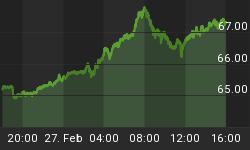Earlier this month, J.P. Morgan made an important announcement that received scant coverage in the media: the bank would now accept gold as collateral for loans. The move appears to have been well-timed, for in the ensuing weeks, the price of gold and silver climbed steeply, based largely on political turmoil in the Middle East. But why should Morgan's decision be of interest to anyone outside the bank?
It can be argued that J.P. Morgan is the world's premier major bank. As such, its decision to accept gold as collateral offers a rare glimpse into the very private financial decision-making of some of the largest and most sophisticated investors in the world, whether governments, corporations, or wealthy individuals.
By reopening its former gold vaults in New York, as well as new facilities in Far Eastern financial centers - which cater to investors who typically have larger gold reserves than Western counterparts - Morgan is telling the world that gold is gaining greater traction as a medium of exchange.
Given that a bank continually looks to provide services that its clients demand, the move suggests that a strategy has taken hold among the highest echelon of investors based on core holdings of precious metals.
Readers of this column know that Euro Pacific has long advised that defensive, long-term investors allocate a portion of their portfolios to precious metals. The reasons could not be more fundamental. Major central banks are in the midst of a campaign of prolonged currency debasement that transfers wealth from prudent individuals to socialist governments with massive debts. To help avoid this hidden tax is to hold savings in something other than fiat currencies.
Apparently, some important Morgan clients agree, and, as a result, many have assembled huge positions in gold - often counted in tons, not ounces. Given the size of these otherwise idle positions, it was perhaps only a matter of time before some holders looked to employ their gold as collateral for cash loans. It is logical to assume that some of the loan proceeds are being used to purchase attractive assets with good yields and upside potential. There is little evidence that holding gold as collateral causes any anxiety to risk managers at J.P. Morgan. Indeed, given the current monetary drift, a vault full of gold should offer far greater confidence than a vault full of paper.
For years, we have forecast stagflation, or a combination of serious inflation and economic depression, for the US. We have described how massive central bank cash infusions have created the conditions for runaway inflation. While the cash injections may have averted a corrective depression in the short-run, they have left a staggering debt cost for future generations.
In the meantime, the world continues to resist cooperation with the Fed's best laid plans. Flash revolutions in the Middle East threaten to disrupt world oil supplies and send gasoline prices higher. There is great concern that higher energy prices will sap what little vitality there is in the developed economies. Any renewed erosion of consumer confidence could herald a double-dip into depression, even the hint of which would convince Western governments to flood the world once again with more massive injections of paper.
This cycle can only end in catastrophe. Morgan's embrace of gold is a solution for survival. The strategy is one that our readers know well.
Subscribe to Euro Pacific's Weekly Digest: Receive all commentaries by Peter Schiff, Michael Pento, and John Browne delivered to your inbox every Monday.
Click here for free access to Euro Pacific's new special report: What's Ahead for Canadian Energy Trusts?
Be sure to pick up a copy of Peter Schiff's just-released economic fable, How an Economy Grows and Why It Crashes. Click here to learn more and order.















